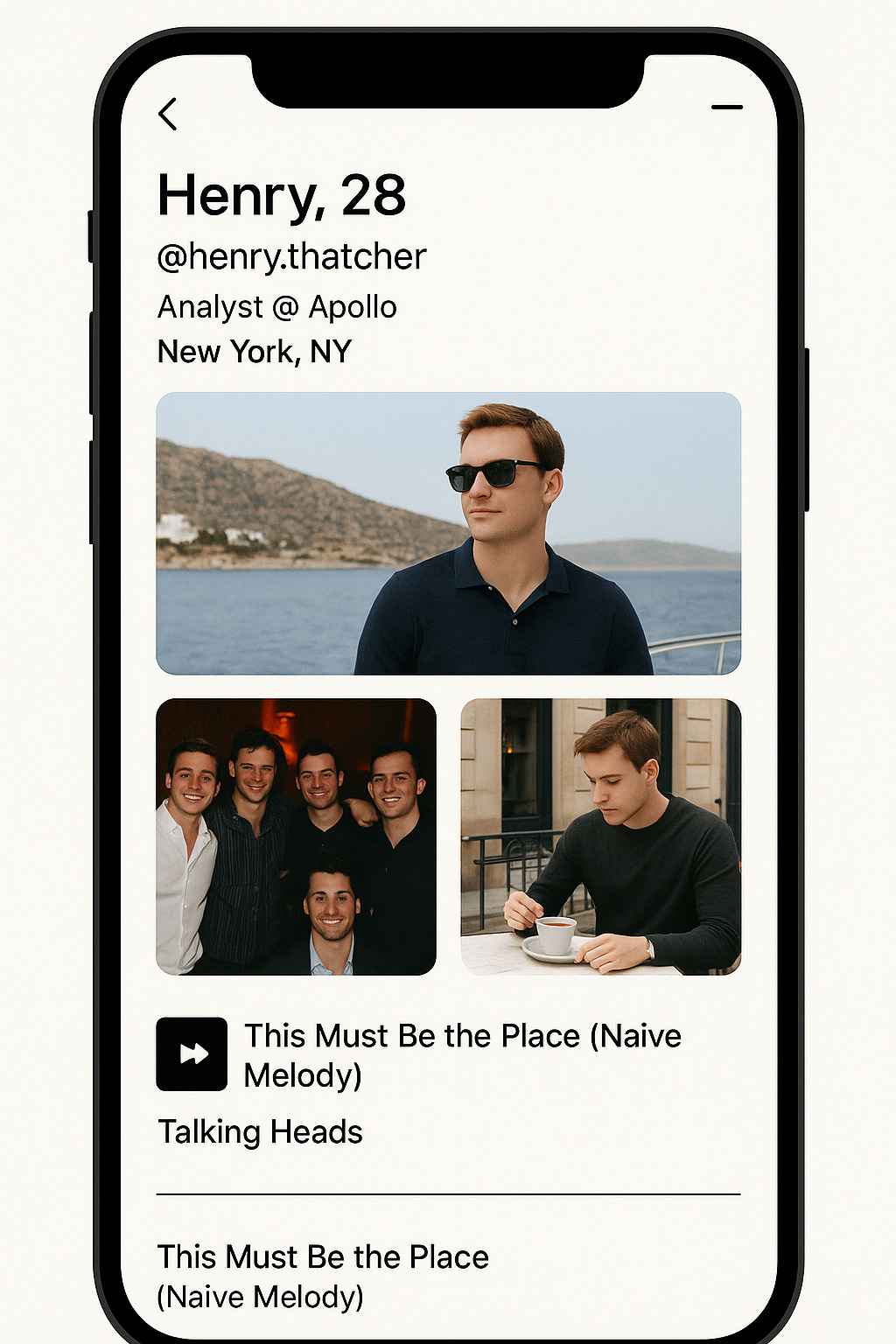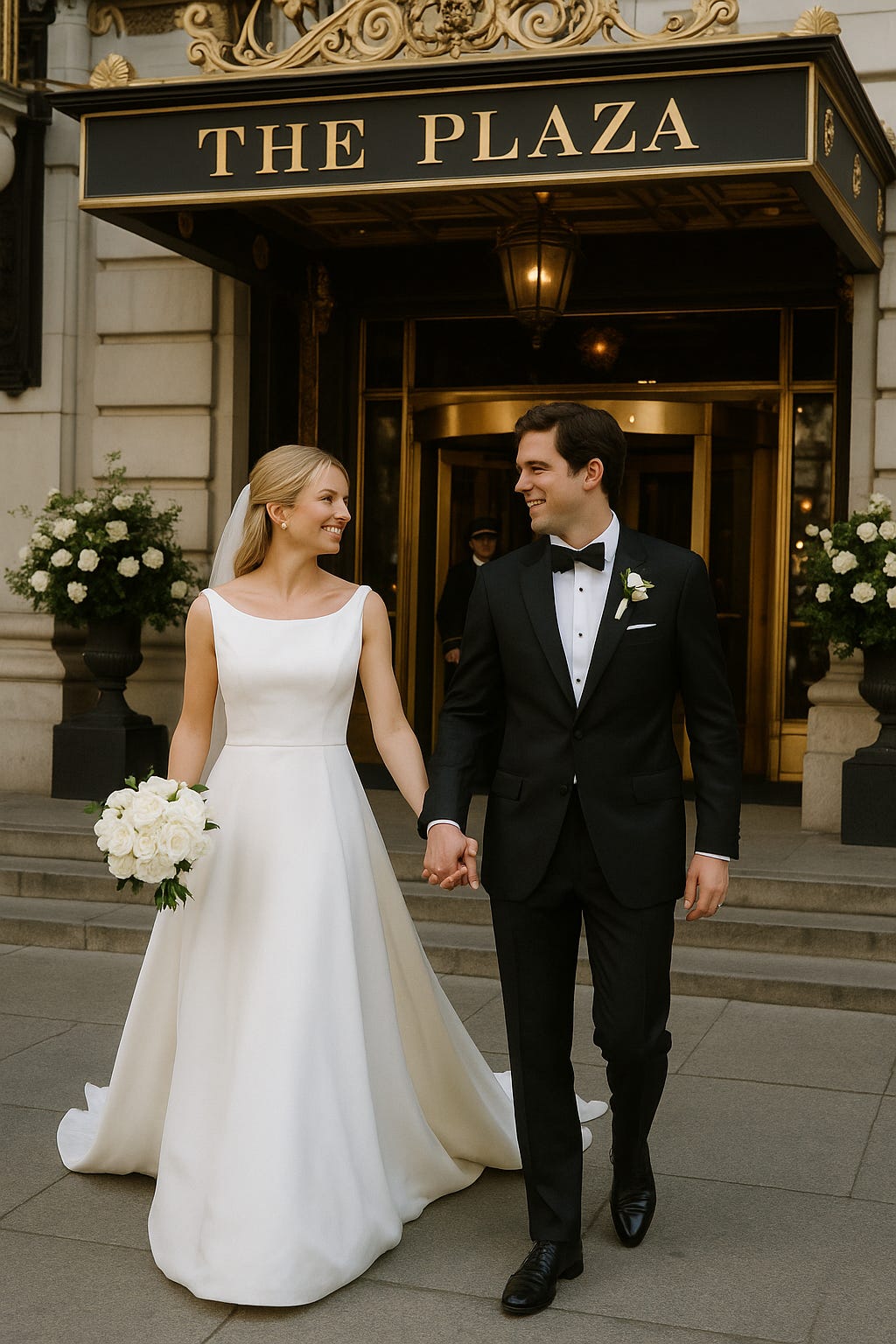Hypothesizing on the Cult of Raya
A meditation on Raya, religion, and love under capitalism.
Henry, 28, instagram: @henry.thatcher, work: analyst @ Apollo, lives: New York, NY, according to his Raya profile—which also included a solo shot taken of him on a yacht in Greece, a photo of him and his friends, Nick, Ale, Luca, and Beto (who were also paying members of Raya) at The Box (their favorite nightclub on the LES), and, of course, a candid of him sipping an espresso at a café in the 6th arrondissement of Paris. Now, all Raya demanded of him was $24.99 a month, and the perfect song to accompany his profile.

When Henry graduated from Princeton 5 years ago, he did not expect to download a dating app. In fact, he envisioned himself marrying his college girlfriend, Penelope, and splitting the $6300 rent of a gorgeous 1 bedroom apartment in Chelsea (60% him, 40% her). She was not the love of his life, no, but Penelope was small, beautiful, and also set to inherit multiple properties around the world. They would have children by 35—just in time for Henry’s promotion to “youngest VP ever” at Apollo.
But the night before they walked across the graduation stage, Penelope told Henry that she received an offer to work for Refugees International in Tigray.
“Pen, don’t act like I know what the fuck that is”
“Henry, it’s in the northern region of Ethiopia. Maybe you would know that if you used your computer for anything other than playing online poker.” She was planning to quit her job at J.P. Morgan and fly to Africa the following week (the night before she had a dream that a mother and child were begging at her knees).
“So,” Henry refused eye contact as her eyes welled “I suppose, it’s over.” And, just like that, the vision lost it’s pulse.
Now, here he was, at 28, living in a 1 bedroom all alone in Murray Hill and still an Analyst at Apollo. He was grateful that Raya gave him another shot at love. Henry adored selectivity; membership always came with its distinct privileges. Raya was just another iteration of his eating club at Princeton, his ALO gym pass, and even his membership to Soho House. The acceptance of his Raya application came the day after his 28th birthday. A moment of divine intervention, he thought. The application review committee must have understood how pathetic he felt, single this close to 30.
Raya, as its founder Daniel Gendelman put it in an interview with Vanity Fair, is a platform for “passionate people, respectful people, and people who are willing to invest in a community.” Raya, meaning friend in Hebrew, is a private, membership based “social network” application exclusive to iOS devices (because anyone eligible to even be on Raya would never dare own an Android). Born from Gendelman’s frustration with traditional, open-access apps like Tinder, he envisioned an online platform where the original impression of others was not skepticism, but trust. However, Gendelman quickly realized that the only way to create trust among users would require a barrier to entry. This barrier, though, does not merely act as a filter for trustworthiness, but also as a purveyor of exclusivity. (Then again, exclusivity and trust may be synonymous.)
Raya intertwines a public desire for privacy with prestige, curating a community of beautiful, wealthy individuals with a common interest—socializing with other beautiful, wealthy individuals. Raya marks an 'in-group'; the selective nature fosters secrecy and cultivates a cult-like atmosphere, becoming a sort of sacred ritual for its users. Raya is an embodiment of the ways capitalism guides societal principles, as though they are religion. It masquerades social stratification and fetishization as an essential part of social interaction.
Marx’s examination of fetish in “The Fetish Character of Commodities– and the Secret It Entails”, provides a comprehensive analysis of fetishism, labeling it a necessary feature of the social and psychological phenomena of a commodity production system. Fetish, or commodity fetishism, refers to the way that commodities in a capitalist system take on a persona of their own as drivers of social interaction and the market rather than by products. Society endows material goods with arbitrary value, and allows that value to rule. An item, as Marx says, “has an enigmatic character, which comes from—where? The equality existing among different kinds of human labor takes on the form of labor products’ equal value-objecthood.” In the capitalist system, we must think of material items such that they possess inherent properties. This way we can justify both energetic and monetary investment. Objects derive value from human labor input. Their value impacts human life in the ways they influence our relationships to one another. As Marx put it, “the relations among the producers themselves, within which the social characteristics of their labor are activated, take on the form of a social relation among labor products.” Under capitalism, we see each other as aiding the creation of elements in the market, rather than contributing to the collective human effort of work, and our relationships are defined as such.
Dating apps introduce a complex scenario for applying Marx’s argument of fetishization. Raya, and similar platforms, represent commodities which require labor. However, they are also commodities that restructure social interaction– as Marx said objects do naturally. However, in the context of Raya, the product itself is access to a network of individuals who are characterized by their social status. People who are classified by their commodities, who fetishize objects that they believe make them “powerful” or “desirable”. Vacations at the Ritz-Carlton, a bungalow in Santa Monica, or even a $350 dollar white t-shirt from The Row, commodities that bestow Raya members value in the Raya universe. Commodities present a mechanism to climb the social ladder, redefining interpersonal relationships through a lens of market dynamics. Raya, then, is not only the marketed product, a platform for “passionate people, respectful people, and people who are willing to invest in a community,” but also a reinforcement and amplification of its member's social capital. Raya provides the social elite more than a community–it provides a profitable commodity in the market.
The exclusivity central to Raya's appeal mimics religion. The platform cultivates an allure that influences member behavior and interaction, both of which mirror the devout, ritualistic adherence of a cult. Walter Benjamin argues that Capitalism is the omnipresent cult we all adhere to: “Capitalism is a purely cultic religion, perhaps the most extreme that ever existed. In capitalism, things have no meaning only in their relationship to the cult; capitalism has no specific body of dogma, no theology.” Raya, arguably, does possess a dogma– capitalism, and it relies on the devotion to capitalism in order to create its own sub-cult. As a result of the strict admissions process, Raya makes users feel "hand selected,” the sign-up regime employs a social contract. By stating their full name, city of residence, university attendance, place of work, and, most importantly, their instagram handle, Raya members abide to assessment by these five pieces of information, a combination of which may or may not translate to worthiness. This contract not only reinforces the exclusivity of the platform, but it demands adherence to certain unwritten rules and norms which mimic a societal adoration of capitalism. Users must continually prove their devotion through their monthly membership payments, adherence to the rules of the platforms, and their commitment to the acquisition of fetishized commodities, rituals that fortify the platform’s cult-like structure.
Naturally, all successful cults are led by their own charismatic leader. Daniel Gendelman carefully crafts the theology of the community space as any religious leader would, making himself out to be the savior of the elite and beautiful, providing them a trustworthy and private place to reside. He strategically built an artificial air of secrecy around Raya since its launch in 2015, controlling the publicly available information about the app and thus maintaining it’s allure. Gendelman refuses to discuss Raya’s admission process, he has never disclosed the size of app’s membership base, and he has never spoken on the financial state of the company. He often reiterates that Raya is “a community for a specific purpose, where there are people who are in and there are people who are out.” Gendelman leveraged his very identity as another element of secrecy in relation to the platform for nearly two years. It was only in a 2017 New York Times interview that Daniel Gendelman finally revealed himself as Raya's founder.
Raya acts as a microcosm for the broader interplay between capitalism and religion. Users grant Raya control over intimacy: their romance and their social connections. They entrust the platform to shape who they meet and how they are perceived within elite spaces. The delegation of personal agency to a capitalist entity reflects a societal willingness for the market to govern private spheres of life, akin to the religious institutions which once took that place.
One night, after 6 months on Raya, Henry found himself drunk off half a bottle of Clase Azul in his chillingly empty apartment, scrolling through profiles. He was back from another Saturday night out with Nick, Ale, Luca, and Beto. They bought a table at the back of The Box, just like they did every week, and Henry was back at 4 am, wondering where it all went wrong.
Struggling to keep his eyes open, he repeatedly reached the “X” on the left side of the screen, that was until he saw Camille, 23, instagram: @thecamillemoreu, work: sales advisor @ Sotheby’s, lives: New York, New York. Small, beautiful, blonde, and likely was set to inherit property abroad. It was a match.
Their first date was at Polo Bar in Midtown. She was unfazed with his ability to get a reservation, he found that attractive. The conversation was empty, she grew up splitting her time between Paris with her father, and Mallorca with her mother. Camille finally came to the U.S. to go St. Paul’s for her last years of high school, and then settled on going to Harvard where she was in Spee. They went on hundreds of dates from there—Carbone, Four Charles, Don Angie, and Cote. Camille rarely ate.
Over time, he fell in love with the promise she embodied. Bright eyed, on a delineated, unwavering path. She was predictable and controllable. She loved him simply because he loved her first.
The wedding of Mr. and Mrs. Henry Thatcher took place at the Plaza Hotel on a bright Saturday the following May. In their vows, Henry and Camille thanked God (Daniel Gendelman) for bringing them together, because it could only be by fate (Raya) that such a remarkable thing could happen.
May everyone be as happy (wealthy) as the beautiful couple was that day on W 59th and 5th Avenue.

Hope you enjoyed this final paper I submitted last Spring for a class called "Capitalism as Religion" (I love my liberal arts education). See you Friday!



